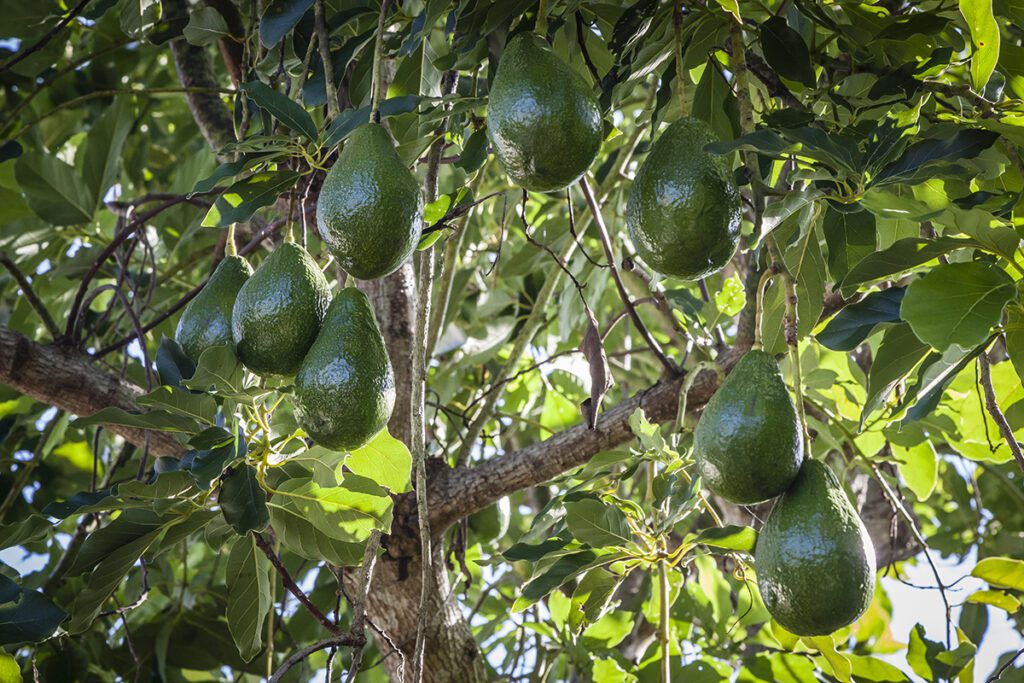Avocados’ Popularity Helps Drive Florida Production
Sponsored by Farm Credit of Central Florida
by ERIKA ALDRICH
Summer is the start of the Florida avocado season in The Sunshine State, so it’s the perfect time to take advantage of this highly nutritional produce! Find them in produce stands, farmers’ markets, and grocery stores from June through January, with peaks in July and August, though some varieties are available outside of the traditional season. Botanically classified as a berry with one large seed, Florida avocados, also called green-skin avocados, are larger and a brighter green than their Hass avocado counterparts.
The History of the Florida Avocado
Avocados have been grown in Florida since 1833, according to the University of Florida’s Institute of Food and Agricultural Sciences (UF/IFAS) but commercial production really took off in the early 1900s in south Florida. Since then, the avocado industry in Florida has continued to grow as consumer demand goes up for this nutritionally dense crop. Currently, avocados are still grown commercially in South Florida, but avocado trees are a popular landscaping choice for homeowners across the state too.
Consumer consumption of avocados has increased since the 1970s, according to the Agricultural Marketing Resource Center. In 2000, avocado consumption was 2.23 pounds per capita, and it had increased to 7.1 pounds per capita in 2016.
Avocado Varieties in Florida
There are currently many different varieties of avocados that can be grown in Florida, with sizes ranging from a weight of a few ounces up to five pounds! Avocados in Florida have been cultivated from either West Indian, Guatemalan, or Mexican-type avocados. Smaller, darker Hass avocados do not fare well in Florida’s humid climate, though there is work that is on-going into creating Hass-like hybrids for Florida. According to UF/IFAS, in Florida, most early season avocado varieties are West Indian types, and midseason and varieties that are available later in the season are mostly Guatemalan-West Indian hybrids or Guatemalan avocado types. Mexican avocado varieties are more cold-tolerant.
The Nutritional Value of Florida Avocados
Avocados are high in calories, but their nutritional value lies in the fact that their calories are made up of high amounts of beneficial monounsaturated oil. Classified as a “good” oil, monounsaturated oils are good for heart health, lower “bad” cholesterol, and more!
Avocados are also rich in potassium, containing 60 percent more potassium than a banana! Additionally, avocados are high in vitamins and minerals like vitamin E, vitamin K, B vitamins, and folate.
Avocado Production in Florida
Florida is the second-largest state for avocado production behind California, though avocado production is not nearly as large as other crops in the state. Approximately 6,000 acres are devoted to avocado production in Florida, with the lion’s share of the production located in south Florida in Miami-Dade and Monroe counties, according to the USDA’s NASS Florida Field Office. The acreage devoted to avocados in Florida has continued to climb, as there were 5,800 acres growing avocados in Florida in 2018.
As to value, in 2017, the latest year that data is available, NASS rated the value of Florida’s avocado production at a little over $8 million. In that year, Florida avocado growers produced 2.86 tons per acre, while 2019 saw 4.3 tons per acre.


